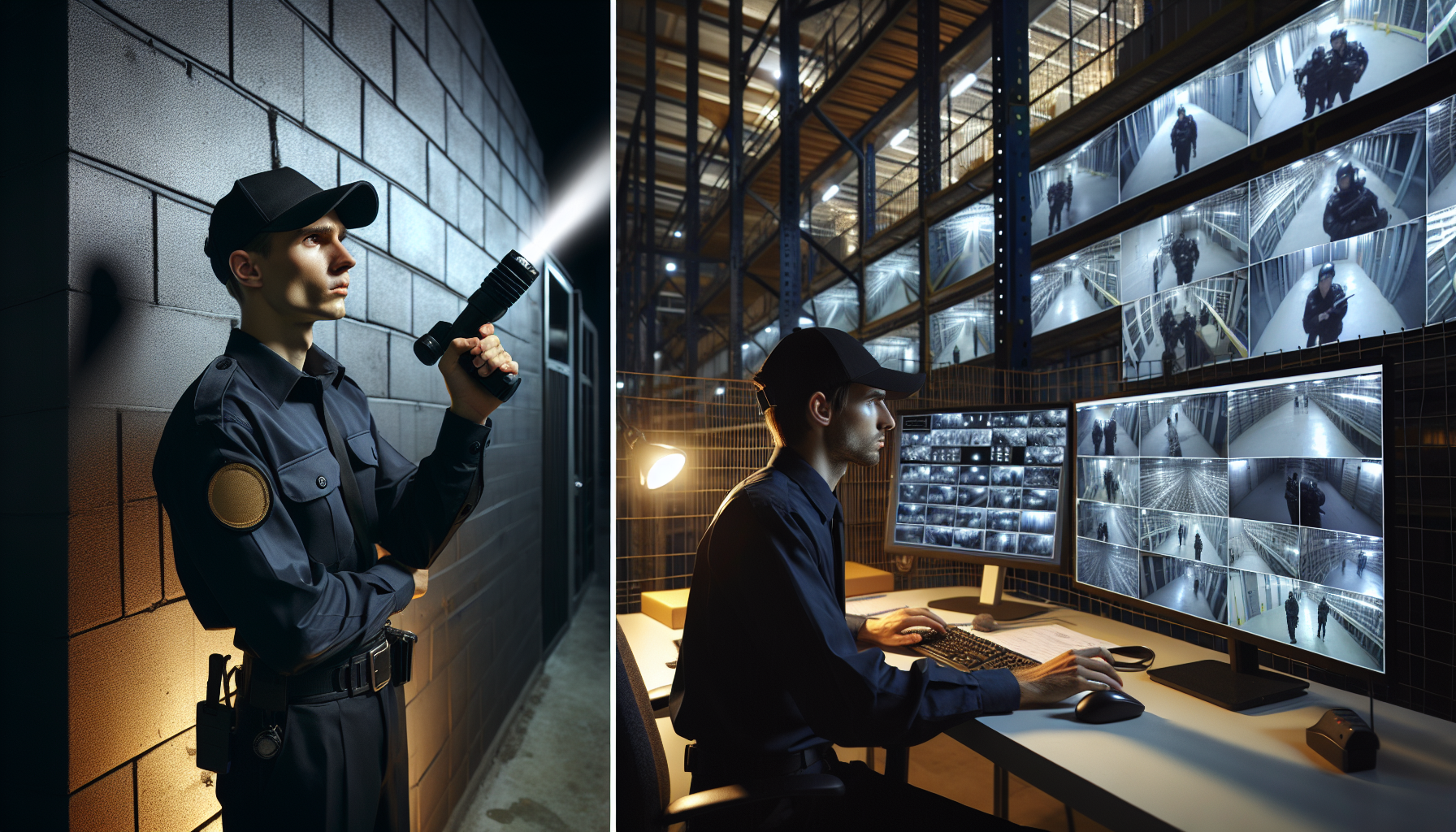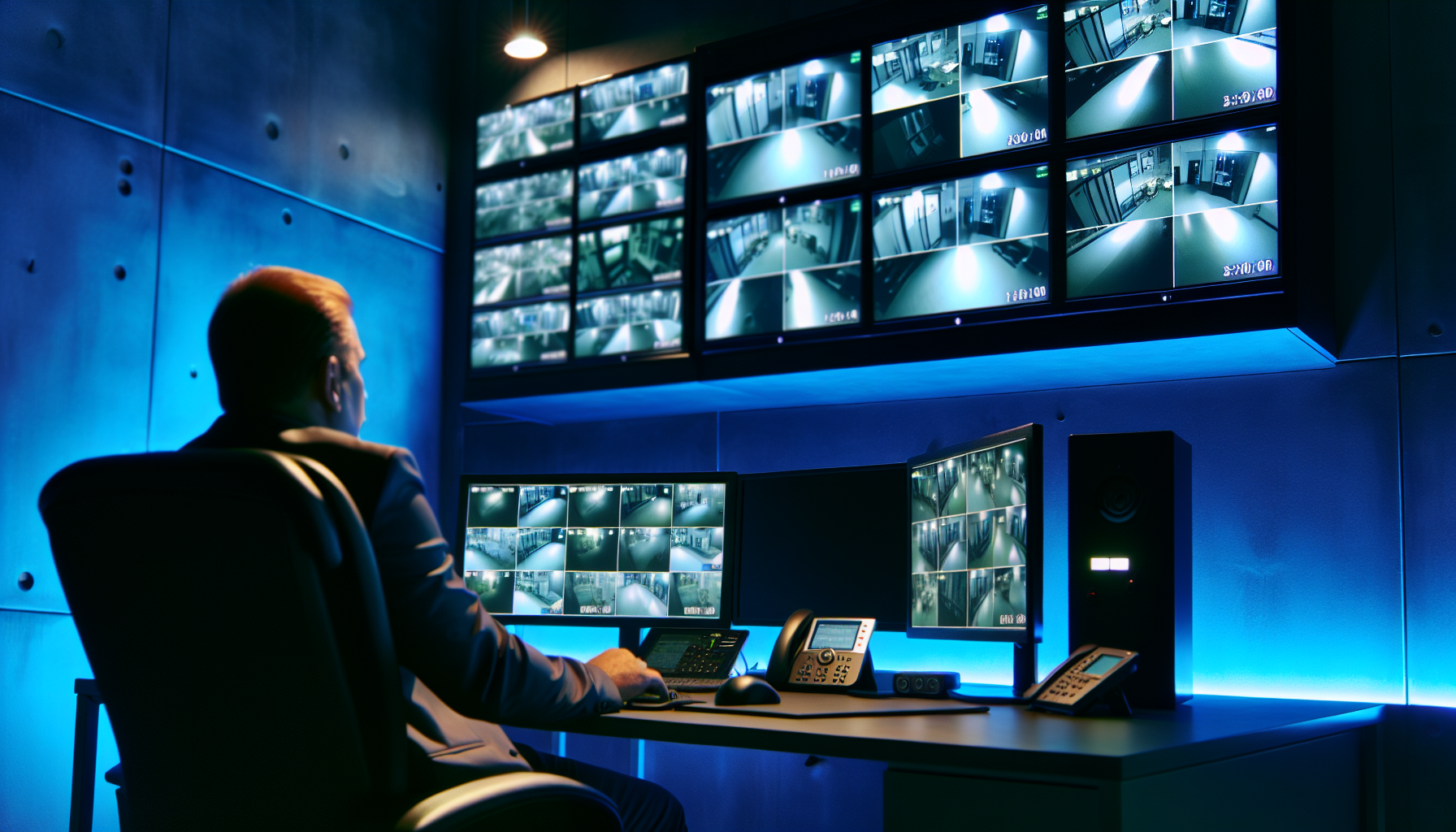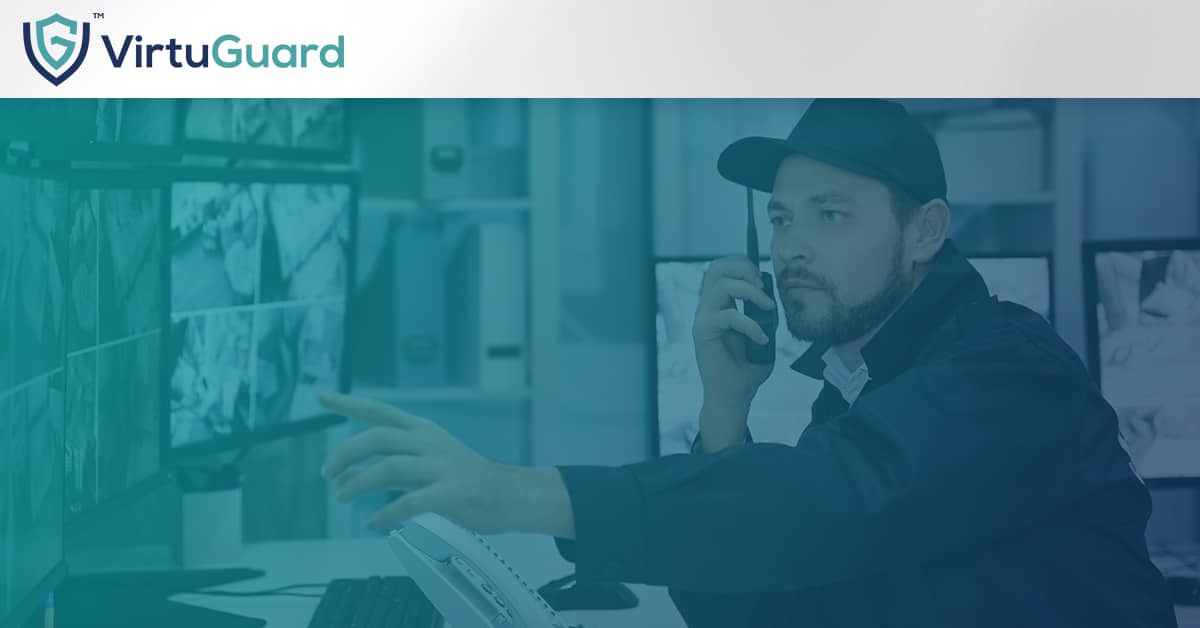Deciding between live video monitoring or security guards? Understand both options’ core benefits for property protection here. We’ll help you navigate through the decision-making process by highlighting crucial differences in coverage, real-time responsiveness, and cost implications – guiding you to an informed choice that aligns with your specific security needs.
Key Takeaways
- Live video monitoring, with its AI technology and non-stop surveillance, offers extensive coverage, proactive threat detection, and cost savings over time, especially for larger properties.
- Security guards provide a visible deterrent, immediate on-the-ground response, and human interaction, fostering a sense of safety and can be effective for smaller properties or those with specific security concerns.
- Careful consideration of property size, security needs and risks, and budget constraints is essential in determining the best protection method between live video monitoring and security guards for individual property requirements.
Comparing Live Video Monitoring and Security Guards

Property protection is innovatively approached through live video monitoring. It utilizes cameras and software to keep a watchful eye over your property, creating a virtual fortress that keeps unwelcome intruders at bay. Unlike onsite security guards who are limited by their physical presence, live video monitoring has the ability to:
- Cover every nook and cranny of your vast commercial property
- Provide real-time alerts and notifications
- Record and store footage for future reference
- Deter potential criminals with its visible presence
With live video monitoring, you can have peace of mind knowing that your property is being actively monitored and protected.
The traditional method of securing properties, namely onsite security guards, presents another option. Their physical presence on the property cannot be underestimated. These trained security professionals patrol the property, often deterring would-be thieves or vandals by their mere presence. Their ability to provide immediate response to threats is a key advantage, adding a human touch to your security measures.
When it comes to effectiveness, both live video monitoring and security guards each exhibit their own strengths. Live video monitoring can detect potential threats before they escalate, providing a sense of proactive security. On the flip side, security guards are there on the ground, able to provide an immediate response and quick situation assessment. However, they can’t be everywhere at once, potentially leaving gaps in surveillance. Thus, the choice between live video monitoring and security guards often boils down to the specific needs and constraints of your property.
Roles and Responsibilities
Serving as a virtual command center for your property, live video monitoring services have the capability to cover every area, a feat that onsite security guards, due to their physical limitations, can’t achieve. From a centralized location, remote guards monitor multiple feeds in real-time, providing extensive coverage. Modern video surveillance systems have even taken a step further with AI-driven automation. They classify events and trigger immediate alerts, allowing virtual guards to access live camera feeds and relevant video clips for a rapid response. This feature is quite efficient in handling business security systems, making live video monitoring a reliable choice.
Contrarily, onsite security guards benefit from their physical presence on the property. Their key role includes:
- Monitoring and protecting merchandise and assets, which can significantly reduce theft incidents.
- Undergoing comprehensive training, preparing them for various emergency scenarios, including first aid, CPR, crisis management, and evacuation procedures.
- Enhancing their capability for an immediate onsite incident response, providing a sense of safety and security for the people on the property.
Effectiveness
The relative effectiveness of live video monitoring, security guards, and security video could sway your decision when choosing between them.
Live video monitoring offers the following advantages:
- Guards can oversee multiple video feeds from a centralized location, making surveillance scalable.
- It ensures comprehensive coverage with no blind spots, offering nonstop vigilance.
- It provides a more comprehensive view of the property, which is crucial for detecting and deterring potential threats effectively.
Contrarily, security guards possess the ability to:
- Respond to crimes or suspicious situations in real-time
- Offer immediate response and quick situation assessment
- Mitigate situations before they escalate into major security issues
However, their ability to cover every area simultaneously is limited, which could potentially leave surveillance gaps.
Cost Comparison
From a cost perspective, implementing live video monitoring could potentially lead to a reduction in labor costs by 25% to 50% compared to on-site security guards. The comprehensive coverage and advanced capabilities of modern surveillance systems favor the long-term cost of CCTV cameras over the addition of security guards. Especially for large properties, traditional security guards typically represent high hourly expenses, leading to greater overall costs for businesses. Implementing video monitoring systems, on the other hand, may offer substantial savings over time compared to the continuous costs of security guard services.
While live video monitoring requires an upfront investment in equipment and installation, it is often more cost-effective in the long run due to flexible pricing and not needing to manage onsite security personnel. Businesses may achieve cost reductions by opting for remote video monitoring due to the absence of overtime or holiday pay usually required for security personnel. Despite the costs, a hybrid system using AI-augmented technology for video surveillance can lead to substantial monthly savings when compared to the cost of hiring security guards. However, the costs can vary according to camera resolution and capabilities, influencing the investment based on specific security requirements.
The Advantages of Live Video Monitoring

With its numerous advantages, live video monitoring presents itself as an attractive choice for property protection. It provides:
- 24/7 surveillance, enabling around-the-clock security coverage
- Significantly reduces crime by up to 50% through its deterrent effect
- Can assist in incident resolution with detailed reporting
Furthermore, business owners can access live video monitoring footage through a video monitoring service, which offers remote monitoring from any location with an internet connection, providing the following benefits:
- Flexibility to keep an eye on their property while on-the-go
- Advanced technology
- Scalability
- Convenience of remote access
All of these factors contribute to a robust property protection strategy, making live video monitoring a key player in the field.
Continuous Surveillance
Continuous, around-the-clock surveillance stands as a key benefit of live video monitoring. It ensures there are no gaps in security coverage even during breaks, unlike onsite security guards. Virtual guard services and virtual patrols operated by trained professionals allow for 24/7 remote security monitoring services, reacting in real-time to threats based on predefined protocols. This proactive approach to crime prevention has proven to be highly effective. For example, at a car dealership, potential wheel theft was intercepted and police were swiftly alerted, thanks to live video monitoring.
Live video surveillance systems offer the following benefits:
- 360-degree property coverage, eliminating blind spots
- Security cameras as part of a remote video surveillance system provide extensive coverage not possible with physical guards due to logistical constraints
- Advancements in video technology, such as high-quality cameras with infrared night vision and remote zoom, offer superior detection capabilities beyond human eyesight and reduce errors.
Most resilient video monitoring systems can operate independently of the power grid, using generators or solar power, and are designed to withstand extreme weather conditions, ensuring constant operation.
Advanced Technology
Advanced AI technology is utilized in live video monitoring systems to enhance their capabilities. AI can analyze large volumes of footage to anticipate possible security incidents, allowing for a proactive approach to threat detection. Intelligent Video Analytics (IVA) powered by AI performs real-time analysis to flag relevant security events, enhancing the efficiency of surveillance operations.
Artificial intelligence technology in surveillance can:
- Detect irregular human behavior and alert security personnel immediately, leading to a more responsive security system
- Reduce false alarms by differentiating between actual threats and environmental factors
- Assist human guards by alerting them to take necessary action promptly.
Scalability and Remote Access
Adding to the benefits of live video monitoring are scalability and remote access. IP-based video surveillance systems facilitate remote access to live and recorded footage, enhancing the ability to monitor and improve business operations from a distance.
Business owners can monitor their properties from anywhere with an internet connection, making it an ideal solution for those who manage multiple properties or need to be away from their property for extended periods. This flexibility, combined with the scalability of video monitoring systems, allows for a property protection plan that can grow and adapt with your business.
The Advantages of Security Guards
As a traditional method of property protection, security guards also bring numerous advantages to the table. They:
- Act as a visible deterrence to criminals
- Offer the flexibility to patrol and keep watch over the property
- Have a quick response time to incidents, which is crucial in preventing situations from escalating.
The presence of security guards on site creates a reassuring atmosphere for employees, management, and customers, enhancing their sense of safety. They also provide value-added services such as:
- Assisting visitors
- Handling security issues professionally
- Maintaining workplace order
- Ensuring safety during labor-related conflicts
Physical Deterrence
Acting as a deterrent to potential criminals, the physical presence of onsite security guards often provides sufficient proactive security to discourage unlawful behavior. Vandals are less likely to target a property when they see security guards on patrol, as this increases the risk of being caught in the act.
By maintaining vigilance and being trained to detect unusual activities, security guards can proactively respond to emergencies and prevent issues like theft and property damage.
Human Interaction and Assistance
Through their visible presence and direct interaction with employees and visitors, security guards provide several benefits:
- They instill a sense of safety and create a reassuring atmosphere.
- They enhance community trust by engaging in educational activities about safety measures and emergency procedures.
- They offer an additional layer of security beyond mere property protection.
These key benefits are crucial for the overall well-being of the people on the property.
Rapid Response to Emergencies
With their presence on the scene, onsite security guards can offer:
- Immediate response to emergencies
- Human interaction
- Protection of lives and property
- Initial medical assistance
- Swift communication with emergency services
- Faster police response times
- Increased likelihood of perpetrator apprehension
In large gatherings or public events, security guards are skilled in crowd control and guiding people during evacuations, helping to prevent panic and ensure safety. Following emergencies, security guards play a key role in deterring looting and maintaining order, ensuring a secure environment for recovery efforts and protecting the premises during investigations and repairs.
The Limitations of Both Options
Despite their unique advantages, it is crucial to understand the limitations of both live video monitoring and security guards in order to develop an effective property protection strategy. Onsite security guards may not always physically intervene during incidents, and their presence may not effectively deter criminals.
Similarly, live video monitoring can also have its share of limitations. Let’s explore these drawbacks in more detail.
Live Video Monitoring Limitations
As with any technology-based solution, live video monitoring may present its own set of challenges. Video issues may occur because of low-resolution cameras, unstable internet connections, or incorrect encoding settings. Poor audio quality can be a result of low-quality microphones, external noise interference, feedback, echo, or latency issues.
In addition, cybersecurity threats pose an additional challenge for live video monitoring systems, requiring robust digital security measures to protect industrial properties.
Security Guard Limitations
Despite the many benefits they offer, security guards also have their own set of limitations. Some of these limitations include:
- They can only be in one place at a time, leading to limited coverage of the property
- Drive-by patrols often result in inadequate response times
- Reduced deterrence
- Reactive security measures after an incident has occurred
Moreover, the cost of employing security guards, particularly for drive-by patrols, can be higher than that of investing in video monitoring systems. Security personnel are also subject to human error, including misjudgment in handling situations, potentially leading to inadequate documentation and legal liabilities.
Factors to Consider When Choosing Protection
Several factors require careful consideration when deciding between live video monitoring and security guards for property protection. The size and layout of your property, your specific security needs and risks, and your budget constraints all play a crucial role in making this decision.
Let’s delve deeper into these factors.
Property Size and Layout
The size and layout of the property play a crucial role in the decision-making process when choosing between live video monitoring and security guards. Live video monitoring can be a more cost-effective option for larger properties with multiple buildings or areas. It offers a way to keep an eye on different locations without the need for physical security patrols..
On the other hand, smaller properties could benefit more from the immediate response that an onsite security guard offers.
Security Needs and Risks
An assessment of security needs and risks is also important in determining the most effective protection method. Onsite security guards may be less viable in high-crime areas and high-profile events because the high level of security required may be challenging to maintain. Similarly, the presence of valuable goods or equipment necessitates heightened security, which can sway the choice between investing in security personnel or advanced surveillance technology.
Budget Constraints
Consideration must also be given to budget constraints. Real-time security camera monitoring may be a more cost-effective option than hiring a full team of security guards for large properties. However, for smaller properties or those with restricted operational hours, employing a single security guard at night may suffice for protection, providing a budget-friendly alternative to more extensive security measures.
Ultimately, the most effective solution will be the one that aligns with your budget while meeting your security needs.
Summary
In conclusion, both live video monitoring and security guards offer unique advantages and have their limitations. Live video monitoring provides extensive coverage, advanced technology, and the convenience of remote access. On the other hand, security guards offer the advantage of physical deterrence, human interaction, and rapid response to emergencies. The choice between the two largely depends on your property’s size, layout, security needs, and budget. It’s crucial to carefully consider these factors and consult with security professionals to determine the most appropriate and effective security solution for your property.
Frequently Asked Questions
What is live monitoring security?
Live monitoring security allows for real-time detection and response to threats, increasing the chances of catching perpetrators and preventing crime. Video monitoring services serve as both a crime prevention tool and a means to catch perpetrators in the act.
Is the ideal choice if you have a security guard who is monitoring a live video feed on site?
If your property is at high risk for theft or vandalism, having an onsite security guard monitoring a live video feed would be the ideal choice for greater security and deterrence. However, for properties with lower security needs, live video monitoring may be more practical and cost-effective.
Are security cameras monitored live?
Unfortunately, most security cameras are still not monitored live, with less than 1% of recorded video surveillance being actively monitored. Call BOS Security to learn more about pro-active video monitoring for your property.
What is the legal difference between a security camera and a surveillance camera?
The legal difference between a security camera and a surveillance camera lies in their purpose and function. Security cameras primarily record public activity, while surveillance cameras are intended to alert authorities of criminal activity.
What is remote video surveillance?
Remote video surveillance allows you to view, manage, and operate video cameras from a distance, providing the ability to monitor live feeds and manage systems offsite.
